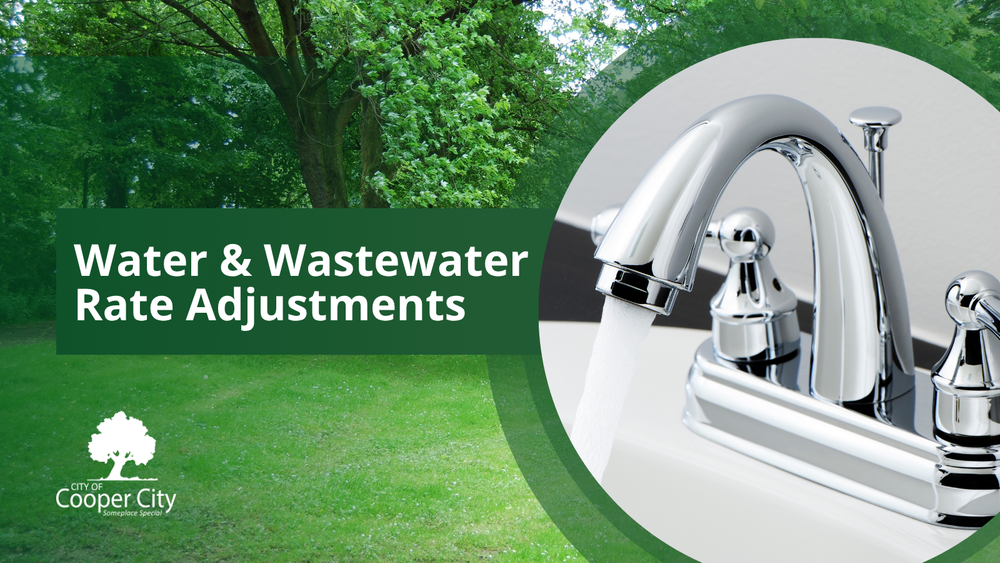We are committed to providing safe, reliable water and wastewater services that our customers can depend on every day. To continue covering the rising costs of chemicals, equipment, electricity, and staffing needed to maintain this high level of service, the City Commission approved a 2.7% adjustment to water and wastewater rates, effective October 1, 2025.
For the average household using 7,000 gallons per month, this change will mean an increase of about $2.92 per month. The adjustment is tied to the Consumer Price Index (CPI), as outlined in City Code, ensuring rates rise gradually and fairly in line with inflation.
We know that any increase in household costs can be challenging, and we want to be fully transparent about why this adjustment is necessary and how it directly supports the safety and reliability of your water.
How Water and Wastewater Services Are Funded
Unlike most City services funded by property taxes, Cooper City’s water and wastewater operations are managed as an enterprise fund. This means the system is operated like a not-for-profit utility, where revenues from water and wastewater customers cover the cost of providing those services.
This structure is especially important because Cooper City also serves customers outside of city limits. Without the enterprise model, Cooper City taxpayers would bear the costs for non-residents. With this model, everyone pays their fair share for the services they use.
Why Rates Are Adjusted Each Year
Each year, Cooper City adjusts its water and wastewater rates based on the CPI. Just as families see higher costs for groceries, energy, and everyday goods, the City also faces higher costs for chemicals, electricity, equipment, and staffing needed to safely treat and deliver water.
By tying rate adjustments to the CPI, we avoid sudden, steep increases in the future while ensuring revenues keep pace with inflation. This steady, predictable approach helps maintain financial stability while continuing to deliver the quality service residents expect.
Accurate Metering and Fairness
Some residents who recently received new water meters have noticed higher utility bills. This is because more than 1,500 of the city’s 12,000 meters had not been recording usage properly in recent years. Households with these faulty meters were only paying the flat base rate, not for the water they actually used.
While this meant lower bills for some, it created about $1.5 million in annual shortfalls to cover the cost of water treatment and delivery, costs that the system still had to bear.
With new, accurate meters, bills now reflect actual water usage. While some households may see increases, this ensures fairness across the system so that every customer pays only for what they use.
Preparing for Long-Term Infrastructure Investments
The recent rate adjustment also supports current operations while preparing Cooper City for the future. The 2024 Water and Wastewater Master Plan Update, presented at a public workshop on March 13, 2025, identified more than $300 million in necessary investments over the next 20 years. These projects are critical to keeping our system safe, reliable, and resilient.
Key projects include:
Headworks Process Project at the Wastewater Treatment Plant
A modernized headworks system will improve efficiency, reduce odors, and prepare the facility for future upgrades.
Plant Electrical System Upgrades
A new electrical and generator building will provide uninterrupted treatment operations during power outages, strengthening emergency preparedness.
Water Main Replacement Program
With about 30% of water mains at or beyond 50 years of service, this proactive program will replace aging pipes each year to reduce service disruptions and improve reliability.
How Cooper City Is Funding These Investments
The City is working to ensure residents don’t shoulder these costs alone by pursuing a mix of grants, bonds, and strategic budgeting.
Grants with Local Match
Cooper City has applied for state and federal funding through programs such as the Florida Department of Environmental Protection’s Resilient Florida Program. However, most grants require the City to match funds locally, ensuring shared investment.
Bond Financing
For larger projects, Cooper City will responsibly use municipal revenue bonds, similar to how homeowners finance a mortgage. With strong bond ratings and low interest rates, this allows us to spread out costs over time while keeping property taxes unaffected. Repayment comes from water and wastewater service revenues, not from general taxes.
By combining grants, responsible borrowing, and steady annual CPI-based adjustments, Cooper City can deliver these critical improvements while maintaining financial sustainability and protecting residents from sudden, large increases. Here are some examples:
Water and Wastewater Treatment Plant Electrical System Project
Grant request: $10.31 million
Required local match: $10.31 million
Total project cost: $24.76 million
Wastewater Treatment Plant Headworks Facility
Grant request: $4.6375 million
Required local match: $4.6375 million
Total project cost: $9.275 million
Federal CPF award already secured: $1.3 million
Gravity Sewer and Manhole Rehabilitation Project
Grant request: $3.75 million
Required local match: $3.75 million
Total project cost: $7.5 million
Our Commitment
These adjustments ensure safe, reliable water today and for future generations. We are committed to transparency and accountability every step of the way.
Questions? Call Utility Billing Customer Service at 954-434-4300 #1.

